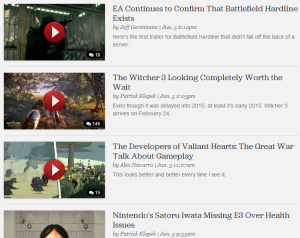When determining what is worth our time, companies battle for mindshare and name recognition. Knowing is half the battle, and to ensure fans are consuming the best games we consistently turn to media outlets for information. Trailers can provide a glimpse, or full blown story synopsis, into what the games is, but select diehard fans want to know more. Like a black hole, some will take in every scrap of data available that crosses their path without thought of the consequences. Not everyone falls into this category and despite outcries regarding spoilers (which is usually retorted with dismissive sayings like “it’s not that big a deal” or “you should have known better”) news sites continually focus their energies and resources on what is going to be released instead of what is already out.
There is a premium on information concerning the unknown. Once a product is available and anyone can post a review on Metacritic, the media has no incentive to spearhead the conversation. The exclusive nature of their information is diluted in a sea of voices, and they don’t want to be lost in the tides. To remain relevant, the media must look forward to the next big product on the horizon. This creates a cycle where outlets are focus on the future instead of the now. We are more interested in what a game “could be” instead of what it actually is.
The majority of articles published center around announcements, a trickle of screenshots, the random leaked document and analysis of trailers. The conclusion to all the exposure is a review, which typically doesn’t generate the same engagement as thepre-coverage. The years of conjecture are thrown out the window; and the review is oftentimes not even fully read but boiled down to a numerical ranking from a single reviewer. Fans no longer care about the information they cultivated previously and focus on the number to justify if a purchase is necessary. The data that was once previous means almost nothing once a release date is hit.
There are select titles that capture fan interest and are followed up with let’s play videos and spoilercasts. These are a way for collectors who don’t have time to absorb every piece of media to still learn about the product and speak as if they had. People want to be part of the conversation, and sometimes instead of actually experiencing the game the best alternative is to read pre-coverage and post-analysis to parrot back sound bites and provide the illusion of familiarity.
I don’t blame the media for catering to their fan’s desires. They need the clicks and will continue to cover products in a way that generate the most attention. I do question if this is a self-destructive behavior on our part. Is it really in our best interest to focus energies on the games with arbitrary release dates that publishers won’t hit instead of the backlog sitting on our shelves? Are we doing ourselves a disservice by being more excited for E3 announcements instead of the games themselves?
Gaming is about experience. There is a perception that information about products unavailable is more valuable than a game that is already out. I encourage you to read reviews for Batman: Arkham City opposed to watching a synopsis of Arkham Knight’s latest trailer; if you like what you read, you can buy a copy of City today instead of waiting five nine months, or more, for Knight to come out. It’s a new approach that could be worth your time…
Level Up, Friends!



